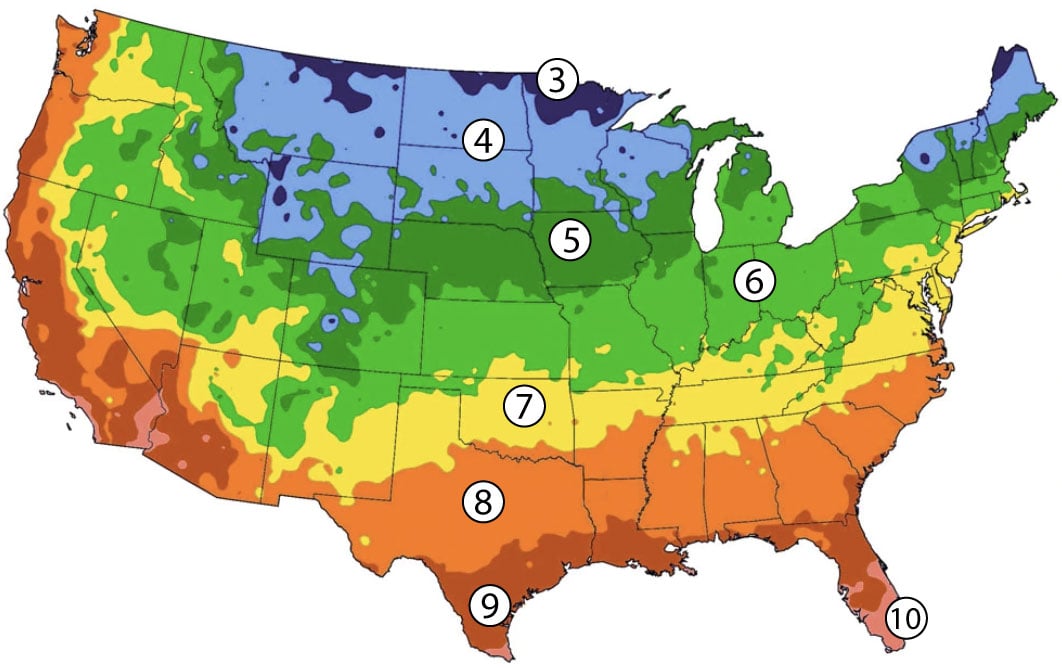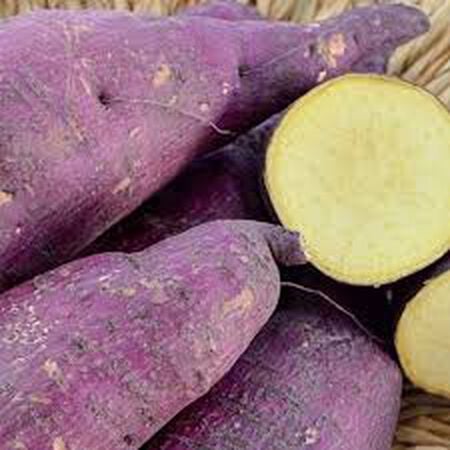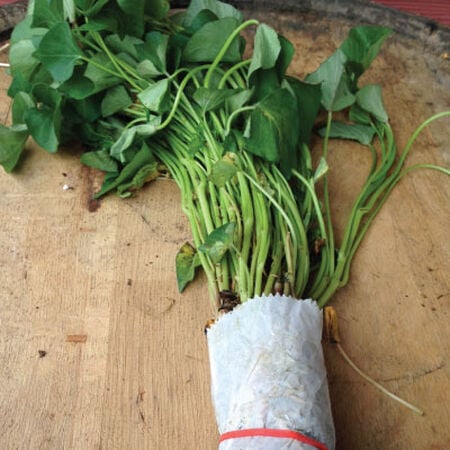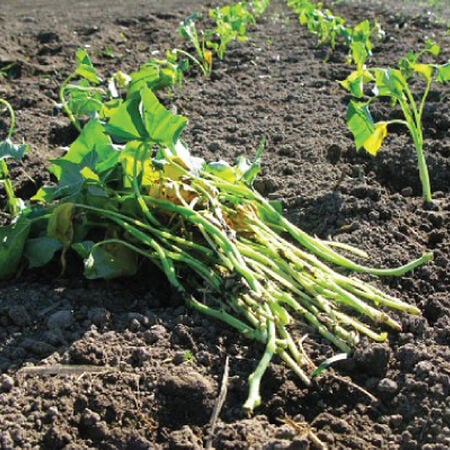Murasaki Purple, Sweet Potato Slips
Key Attributes
Product Details
Weight
.25Plant Height
10-12"Botanical Name
Ipomoea batatasSeed Type
SlipsSow Depth
3-4"Breed
Open-pollinatedSun
Full SunLife Cycle
AnnualCategories
PotatoDays To Maturity (# Days)
90Seeds Per Acre
14,500 SlipsComponents
Growing Instructions
![]() Learning Download: How to Grow Sweet Potatoes
Learning Download: How to Grow Sweet Potatoes
Sweet potatoes may appear similar to regular potatoes, but unlike regular potatoes which grow best in a cooler environment, sweet potatoes do better in the heat.
Before Planting: For those living in warm climates, plant sweet potatoes a month after the last spring frost, as soon as the temperatures outside and the soil temperatures have warmed up considerably. To obtain a sweet potato slip, cut a sweet potato in half lengthwise and bury each half in damp potting soil. Keep the slips moist and warm, and shoots should sprout within a few days. Leaves will follow the shoots.
Planting: Shoots should be between 4 and 8 inches tall before they’re transplanted outside. When the shoots are old enough, transplant them outside. Since sweet potatoes like it warm, plant the transplants in raised rows, which are usually about 8 inches higher than ground level.
Watering: Water your sweet potato plants weekly since a regular watering schedule will help prevent the sweet potato skin from splitting.
Fertilizer: Add fertilizer containing potassium approximately two weeks after planting the slips.
Days to Maturity: Tubers are ready to harvest when the plant’s foliage turns from green to yellow. (See each variety for days to maturity)
Harvesting: The tubers will grow close to the surface, so dig gently when harvesting. If harvesting too roughly, the sweet potato skin will bruise.
Tips: To avoid vines over growing , gently weed the vines two weeks after you’ve planted the slips. Avoid using a hoe so you don’t disrupt the feeder roots.
Shipping Schedule
Sweet potato slips will ship at the appropriate time for your planting zone. The chart below estimates when your sweet potato slips will arrive. You will receive an email notifying you when your strawberry roots ship giving you a few days to prepare for planting.
This item’s size, weight, or shape may require an additional shipping surcharge based on the shipping location selected. Specific charges will be displayed during checkout. We are unable to take specific shipping dates at this time.
*This product is perishable and does not ship outside the United States.
|
 |
Our Seed Promise
 "Agriculture and seeds" provide the basis upon which our lives depend. We must protect this foundation as a safe and genetically stable source for future generations. For the benefit of all farmers, gardeners and consumers who want an alternative, we pledge that we do not knowingly buy or sell genetically engineered seeds or plants.
"Agriculture and seeds" provide the basis upon which our lives depend. We must protect this foundation as a safe and genetically stable source for future generations. For the benefit of all farmers, gardeners and consumers who want an alternative, we pledge that we do not knowingly buy or sell genetically engineered seeds or plants.
The mechanical transfer of genetic material outside of natural reproductive methods and between genera, families or kingdoms, poses great biological risks as well as economic, political, and cultural threats. We feel that genetically engineered varieties have been insufficiently tested prior to public release. More research and testing is necessary to further assess the potential risks of genetically engineered seeds. Further, we wish to support agricultural progress that leads to healthier soils, to genetically diverse agricultural ecosystems, and ultimately to healthy people and communities.
To learn more about the "Safe Seed Pledge" please visit www.councilforresponsiblegenetics.org.
Key Attributes
Product Details
Weight
.25Plant Height
10-12"Botanical Name
Ipomoea batatasSeed Type
SlipsSow Depth
3-4"Breed
Open-pollinatedSun
Full SunLife Cycle
AnnualCategories
PotatoDays To Maturity (# Days)
90Seeds Per Acre
14,500 SlipsComponents
Growing Instructions
![]() Learning Download: How to Grow Sweet Potatoes
Learning Download: How to Grow Sweet Potatoes
Sweet potatoes may appear similar to regular potatoes, but unlike regular potatoes which grow best in a cooler environment, sweet potatoes do better in the heat.
Before Planting: For those living in warm climates, plant sweet potatoes a month after the last spring frost, as soon as the temperatures outside and the soil temperatures have warmed up considerably. To obtain a sweet potato slip, cut a sweet potato in half lengthwise and bury each half in damp potting soil. Keep the slips moist and warm, and shoots should sprout within a few days. Leaves will follow the shoots.
Planting: Shoots should be between 4 and 8 inches tall before they’re transplanted outside. When the shoots are old enough, transplant them outside. Since sweet potatoes like it warm, plant the transplants in raised rows, which are usually about 8 inches higher than ground level.
Watering: Water your sweet potato plants weekly since a regular watering schedule will help prevent the sweet potato skin from splitting.
Fertilizer: Add fertilizer containing potassium approximately two weeks after planting the slips.
Days to Maturity: Tubers are ready to harvest when the plant’s foliage turns from green to yellow. (See each variety for days to maturity)
Harvesting: The tubers will grow close to the surface, so dig gently when harvesting. If harvesting too roughly, the sweet potato skin will bruise.
Tips: To avoid vines over growing , gently weed the vines two weeks after you’ve planted the slips. Avoid using a hoe so you don’t disrupt the feeder roots.
Shipping Schedule
Sweet potato slips will ship at the appropriate time for your planting zone. The chart below estimates when your sweet potato slips will arrive. You will receive an email notifying you when your strawberry roots ship giving you a few days to prepare for planting.
This item’s size, weight, or shape may require an additional shipping surcharge based on the shipping location selected. Specific charges will be displayed during checkout. We are unable to take specific shipping dates at this time.
*This product is perishable and does not ship outside the United States.
|
 |
Our Seed Promise
 "Agriculture and seeds" provide the basis upon which our lives depend. We must protect this foundation as a safe and genetically stable source for future generations. For the benefit of all farmers, gardeners and consumers who want an alternative, we pledge that we do not knowingly buy or sell genetically engineered seeds or plants.
"Agriculture and seeds" provide the basis upon which our lives depend. We must protect this foundation as a safe and genetically stable source for future generations. For the benefit of all farmers, gardeners and consumers who want an alternative, we pledge that we do not knowingly buy or sell genetically engineered seeds or plants.
The mechanical transfer of genetic material outside of natural reproductive methods and between genera, families or kingdoms, poses great biological risks as well as economic, political, and cultural threats. We feel that genetically engineered varieties have been insufficiently tested prior to public release. More research and testing is necessary to further assess the potential risks of genetically engineered seeds. Further, we wish to support agricultural progress that leads to healthier soils, to genetically diverse agricultural ecosystems, and ultimately to healthy people and communities.
To learn more about the "Safe Seed Pledge" please visit www.councilforresponsiblegenetics.org.






